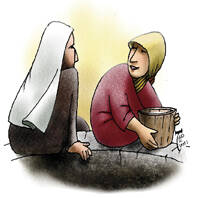Water From Another's Well
It is said that the next major wars will be fought over water, not oil. There are growing concerns over the increasing demand for fresh, clean water as the supply is decreasing. Today’s challenges about ensuring access to safe water for every human being is one entry point to reflection on today’s Gospel, which centers on thirst for living water that is eternally replenished.
The account opens with a tired and thirsty Jesus asking a woman of Samaria for water. Like millions of women who even today spend hours of their day collecting water, the Samaritan woman comes, perhaps for a second time that day, to draw water. Most women would come to the well early in the morning, not at the hottest part of the day.
Most likely the Fourth Evangelist intends the noontime detail to be taken symbolically. In this Gospel, light signifies coming to belief, while darkness corresponds to unbelief. In contrast with the preceding story of Nicodemus, who came to Jesus at night and is unable to believe, the woman of Samaria comes at the brightest part of the day and will come to full belief.
Jesus and the woman enter into a deep theological conversation, laden with symbolism. As often happens in the Fourth Gospel, the two are cast as representative characters for the whole of their people. They begin by speaking of their thirsts, their shared human need, and this enables a conversation by which they can begin to break down the enmity between their two peoples. Elsewhere in the Gospel, Jesus speaks of his thirst to draw all people to God through himself (12:32) and of his desire for all to be one (17:21).
Step by step Jesus and the woman reveal themselves more deeply to each other. They speak of some of their deepest thirsts: for worship, salvation and the search for truth. They listen intently and allow their perceptions of the other to shift, just as we may need to change our former impressions of the Samaritan woman. The focus of the dialogue is not on her marital history, nor is she said to be a sinner. Jesus does not tell her to go and sin no more, as he does to the man at the pool of Bethesda who had been paralyzed (Jn 5:14) or to the woman caught in adultery (Jn 8:11).
The woman’s understanding of Jesus progresses from the simple observation that he is a Jew to pondering whether he is greater than Jacob. Another step is her recognition of him as a prophet when he uses the marital metaphor favored by Hosea to speak of the peoples’ relationship with God. Finally, she arrives at the conclusion that Jesus is the Messiah, which she shares with her townspeople in question form, so that they too can enter into the process of discovery that will culminate in faith.
This encounter illustrates a process by which enmity can be transformed into friendship. The two start by focusing on common thirsts that spring from their shared humanity. They had to let go of their ingrained stereotypes of the other, and they had to stop avoiding each other. They had to be willing to stay in the conversation for a good deal of time and not give up when they stumbled over their differences. They had to be willing to overcome the objections of some of their own people. They had to be willing to stay with each other. As the waters of understanding wash away ignorance and fear, the gift of living water wells up within them, making each one a spring from which others who thirst may drink.
This article also appeared in print, under the headline “Water From Another's Well,” in the March 21, 2011, issue.








